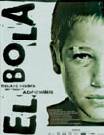|
|
||||
|
|
by Donald Levit  Tourist posters and Pedro Almodóvar to the contrary, Spain’s modern cities and towns do not look very different from most anywhere in the Western world. Between 1950 and 1985, that nation constructed more urban viviendas per capita than any other – and it shows. Excepting a few small well-publicized spots, Madrid in particular is a rather dull affair. The capital’s residential areas and mushroomed suburban ring are not so much unpleasant mean streets as merely unimaginative. Writer-director Achero Mañas’ European-award winning El Bola most effectively sets its (at first) seemingly common tale against this backdrop. Avoiding the bizarre and sensational to which we have grown accustomed, the first half of this Spanish film disarmed me. It seems straightforward, the well-told story of withdrawn, vaguely fearful twelve-year-old Pablo (Juan José Ballesta). Nicknamed "El Bola" (unhappily subtitle-translated as "Pellet"), the lad does not mix well yet plays harrowing railroad-track games with classmates, works in the hardware store of a father with whom he does not communicate easily, and lives with both parents and a frail grandmother. In mid-term, a new student, Alfredo (Pablo Galan), is introduced to the class. Drawn to him, lonely Pablo follows the new boy through the streets, finds out where he lives, knocks on the door and makes friends. The two hang out together, enjoy fast food as well as rides at the famous Amusement Park, and watch Alfredo’s father José (Alberto Jiménez) at his trade of tattoo artist. Loose and easy, the latter’s family, dog Golfo, and friends accept Pablo, whose eyes take in the love and openness so strained in his own home, where meals are solemn and an incontinent Grandma (Soledad Osario) is bathed by mother and son. Not least important is Alfredo’s adored, engaging baby brother, for we learn that before Pablo’s birth, a brother had died in a car accident. After visiting a family friend who is hospitalized and dying of AIDS, the boys discuss God and death, a theme several times reinforced by the railway "chicken" game. But skipping school to go to the hospital – and , terrified, lying about it – plus a wonderful day’s outing to the mountains with his friend’s family, gets Pablo into deep trouble at home. There have been hints of darkness before, and apparently most all the school knew, but suddenly the whole abusive relationship is uncovered. One horrifying scene plays out even more starkly against this mundane middle-class world of parents and slightly, but normally and innocently, rebellious children (cigarettes, a girlie magazine, hooky, obscenities – the latter imaginative, common and hardly taboo in Peninsular Spanish). The hands of Pablo’s troubled father Mariano (Manuel Moron) tremble so much now that he can barely light a cigarette. But only in the closing seconds, intercut with the recurrent train tracks, does the son open the full depths of his degradation. Even before this, however, choices have had to be made – Pablo, somehow to believe and to trust; Alfredo, between loyalty and duty; and José, between justice based on love and what the law might proclaim: "I’m not thinking about me. I’m thinking of the kid." Child abuse cases are now surfacing with alarming frequency, and it’s naïve to assume this is an American problem only or that such situations are the whole iceberg rather than its tip. Not employing gimmicks or tipping off the nightmare soon to be faced, El Bola draws us in: but what appears as a perhaps shadowed coming-of-age movie sure-handedly becomes a deadly-in-earnest portrait in which ideas are neither sledgehammered nor preached. Appreciation for this restrained treatment could be felt in the reaction of the audience at the screening I attended: there was not a sound. That is a tribute. (Released by Film Movement; not rated by the MPAA.) |
||
|
© 2026 - ReelTalk Movie Reviews Website designed by Dot Pitch Studios, LLC |



